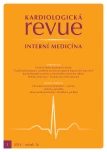-
Medical journals
- Career
More arguments for conservative treatment of coronary artery disease in chronic form
Authors: L. Kotík
Authors‘ workplace: Interní oddělení Thomayerova nemocnice, Praha
Published in: Kardiol Rev Int Med 2014, 16(1): 39-43
Category: Cardiology Review
Overview
Invasive methods for treatment of coronary artery disease in chronic form were, for a long time, believed to be causal treatment that definitely diminish patient morbidity and mortality. By contrast, lifestyle and pharmacological therapy were seen as valuable but not lifesaving. In the last few years a change can be seen in the view on coronary artery disease. It is a much more diffusive and complicated process in the coronary tree. It is not merely a question of the critical stenotic areas; the new idea of vulnerable plaque, which presents the same danger of complication as critically stenotic areas, is also important. A great surprise for experts was the result of various studies confirming the inability of invasive procedures to prolong life in patients with chronic coronary disease. On the other hand, there has been more evidence that lifestyle changes and expanding pharmacological possibilities can have a significant positive effect on morbidity and mortality. This article aims to present the problem as it is currently being discussed.
Keywords:
chronic coronary artery disease – invasive and conservative therapy – vulnerable plaque – lifestyle changes – expanding pharmacological possibilities
Sources
1. Boden WE, O’Rourke RA, Teo KK et al. Optimal medical therapy with or without PCI for stable coronary disease. N Engl J Med 2007; 356 : 1503 – 1516.
2. BARI 2D Study Group. Frye RL, August P, Brooks MM et al. A randomized trial of therapies for type 2 diabetes and coronary artery disease. N Engl J Med 2009; 360 : 2503 – 2515. doi: 10.1056/ NEJMoa0805796.
3. Stergiopoulos K, Brown DL. Initial coronary stent implantation with medical therapy vs medical therapy alone for stable coronary artery disease: meta‑analysis of randomized controlled trials. Arch Intern Med 2012; 172 : 312 – 319. doi: 10.1001/ archinternmed.2011.1484.
4. Rouleau JL, Michler RE, Velazquez EJ et al. The STICH trial: evidence‑based conclusions. Eur J Heart Fail 2010; 12 : 1028 – 1030. doi: 10.1093/ eurjhf/ hfq140.
5. De Bruyne B, Pijls NH, Kalesan B et al. Fractional flow reserve ‑ guided PCI versus medical therapy in stable coronary disease. N Engl J Med 2012; 367 : 991 – 1001. doi: 10.1056/ NEJMoa1205361.
6. Stone GW, Maehara A, Lansky AJ et al. A prospective natural ‑ history study of coronary atherosclerosis. N Engl J Med 2011; 364 : 226 – 235. doi: 10.1056/ NEJMoa1002358.
7. The Joint Commission and the American Medical Association. Proceedings from the National Summit on Overuse, 2012, Elective Percutaneous Coronary Intervention (PCI), Released, 2013; 23 – 27.
8. Chow CK, Jolly S, Rao ‑ Melacini P et al. Association of diet, exercise, and smoking modification with risk of early cardiovascular events after acute coronary syndromes. Circulation 2010; 121 : 750 – 758. doi: 10.1161/ CIRCULATIONAHA.109.891523.
9. Ho PM, Magid DJ, Shetterly SM et al. Medication nonadherence is associated with a broad range of adverse outcomes in patients with coronary artery disease. Am Heart J 2008; 155 : 772 – 779. doi: 10.1016/ j.ahj.2007.12.011.
10. Kim JS, Kim CH, Chun KJ et al. Effects of trimetazidine in patients with acute myocardial infarction: data from the Korean Acute Myocardial Infarction Registry. Clin Res Cardiol 2013; 102 : 915 – 922. doi: 10.1007/ s00392 – 013 – 0611 – 0.
11. Xu XH, Zhang WJ, Zhjou YJ et al. Effects of trimetazidine therapy on left ventricular function after percutaneous coronary intervention. Chin J Cardiol 2013, 41 : 205 – 209.
12. Frasgasso G, Rosano G., Baek SH et al. Effect of partial fatty acid oxidation inhibition with trimetazidine on mortality and morbidity in heart failure: result from an international multicentre retrospective cohort study. Int J Cardiol 2013; 63 : 320 – 325. doi: 10.1016/ j.ijcard.2012.09.123.
Labels
Paediatric cardiology Internal medicine Cardiac surgery Cardiology
Article was published inCardiology Review

2014 Issue 1-
All articles in this issue
- Beneficial use of transcranial Doppler ultrasound in invasive treatment of carotid artery disease
- Permanent cardiac pacing in terms of the new European recommendations from 2013
- Cardiohepatic syndrome in patients with chronic heart failure
- Prognostic significance of liver enzyme elevations in acute coronary syndromes
- Development of kidney function parameters in patients with advanced heart failure treated with levosimendan – retrospective analysis
- Renal denervation – future or disappointment
- Deep venous thrombosis and pulmonary embolism associated with hormonal contraceptives use
- More arguments for conservative treatment of coronary artery disease in chronic form
- Complex nursing care documentation for short-term hospitalization of patients indicated for permanent pacemaker implantation
- Chronic kidney disease – a new classification and therapy
- Drug therapy in chronic kidney disease
- Acute kidney injury
- Rapidly progressive glomerulonephritides (crescentic glomerulonephritides)
- Selected renal diseases in pregnancy
- Urinary tract infections
- Cardiology Review
- Journal archive
- Current issue
- Online only
- About the journal
Most read in this issue- Acute kidney injury
- Selected renal diseases in pregnancy
- Rapidly progressive glomerulonephritides (crescentic glomerulonephritides)
- Drug therapy in chronic kidney disease
Login#ADS_BOTTOM_SCRIPTS#Forgotten passwordEnter the email address that you registered with. We will send you instructions on how to set a new password.
- Career

